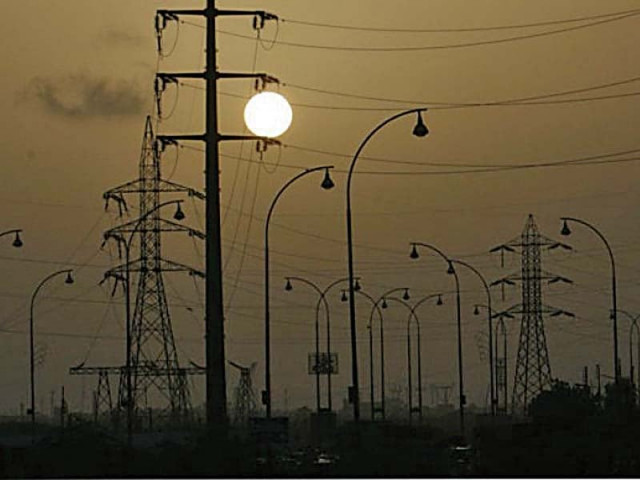Nawaz-led govt yet to fulfil promise of wholesale energy market
It will attract investment from competitive suppliers in generation resources

The flaw in this (cost-plus pricing) mechanism is that a generation company can earn higher profit by simply overstating its operational costs. PHOTO: REUTERS
The excess capacity over peak demand, which is known as reserve margin, is quite low in Pakistan. Since it helps in balancing any sudden variation in energy markets, it is used as an indicator of production reliability.
As election looms, so does a higher budget deficit
The lower reserve margin means that the existing power generation system is insufficient to support the overall infrastructure in case of any plant breakdown and to cover the forecasting errors made by the National Transmission and Despatch Company (NTDC).
The NTDC was established in 1998 to coordinate the demand and supply of electricity in the country. Although it is presented as an independent system operator, yet it works under immense control of the government.
As like many other publicly owned enterprises, the NTDC embodies operational mismanagement and lack of capacity in maintaining the balance between supply and demand.
Separately, the government’s control over Nepra is causing severe market imperfections, resulting in many other problems such as increase in transaction costs, which creates barriers for new entrants in energy markets, thus, threatens competitiveness.
Zardari can’t bail out Nawaz: Imran
At the production stage, the existing cost-plus pricing mechanism is believed to be highly inefficient. Nepra sets the tariffs based on operational costs of power generation plus a mark-up percentage.
The flaw in this mechanism is that a company can earn higher profit by simply overstating its operational costs. There is no incentive for cost minimisation. Any company which reduces its operational costs will earn a lower profit, then why it will ever do that?
At the retail stage, the incremental tariff rate is highly ineffective in covering the supply costs. Any upheaval in the supply cost is largely unshared by the retail side. The resulting deficit between the cost of supply and retail price is, therefore, covered by government subsidies.
What needs to be done?
Countries like the US, UK and Argentina have experienced a similar electricity crisis in the past, which Pakistan is facing today. However, they deregulated the sector and introduced competitive wholesale and retail electricity markets that worked extremely well.
In the wholesale market, the electricity generated by a power company is bought and re-sold a number of times before being finally served to the end-user.
‘Pakistan’s economy will collapse in the next 10 years’
Underinvestment in the energy sector, particularly at the production stage, is a point of major concern. The establishment of the wholesale market can be helpful in attracting investment from competitive suppliers in the generation resources. This increase in investment will definitely ensure sustainability in the supply of electricity.
The existing electricity infrastructure lacks the capacity of countering any unexpected shock to the electricity market. However, wholesale markets can ensure reliable production by providing a platform of spot markets in which a generator can offer its production any time at a competitive price.
Most of the countries use spot markets in order to overcome any unexpected deviation in the energy market.
Make Nepra independent
Wholesale electricity markets are usually organised under an independent system operator (ISO).
As a regional planner, it is responsible for balancing the supply and demand and making sure that the right infrastructure is built at the right place and at the right time.
How toothless have Pakistani regulatory bodies become
Since there are multiple sellers in the market, the ISO ensures that no preference is given to any vertically integrated utility against other competitive generators and ensures competition.
As sales in electricity markets occur within multiple regions, a supplier has to pay the transaction cost before entering into any other region. However, the ISO system reduces this transaction cost which not only facilitates the producers but also the end-users.
Market forces should decide prices
As opposed to the inefficient cost-plus pricing mechanism, the wholesale electricity market offers a system of uniform clearing price auction.
Under this system, the generators place bids with an independent market administrator, which then dispatches the lowest bidder first and so forth until all the demand is met.
Each generator then receives the same per unit price as what was paid to the last unit of electricity needed to meet the total demand regardless of their actual bid.
In this mechanism, profit can be earned only when the operational cost falls below the clearing price, otherwise, there will be no or very little profit. Hence, this pricing system drives generators to reduce their operational cost by ensuring efficiency – a win-win situation for both the buyer and seller.
In many countries, establishment of wholesale electricity markets has done a tremendous job in eroding inefficiencies in the electricity sector. Pakistan can also learn from their experience by adopting the same policies.
The government has made some headway at the policymaking level, however, the reform process is quite slow. For instance, the regulatory framework for the net metering and wheeling of electricity has been approved by Nepra, but distribution and generation companies have yet to make the necessary arrangements.
An independent report, which has been tracking performance of the government since May 2013, also suggests that performance of the PML-N administration is not up to the mark in the area of energy security.
Ali Salman is the founder and executive director of PRIME Institute, an independent think tank based in Islamabad, and Talha Hassan is a research analyst
Published in The Express Tribune, December 26th, 2016.
Like Business on Facebook, follow @TribuneBiz on Twitter to stay informed and join in the conversation.



















COMMENTS
Comments are moderated and generally will be posted if they are on-topic and not abusive.
For more information, please see our Comments FAQ